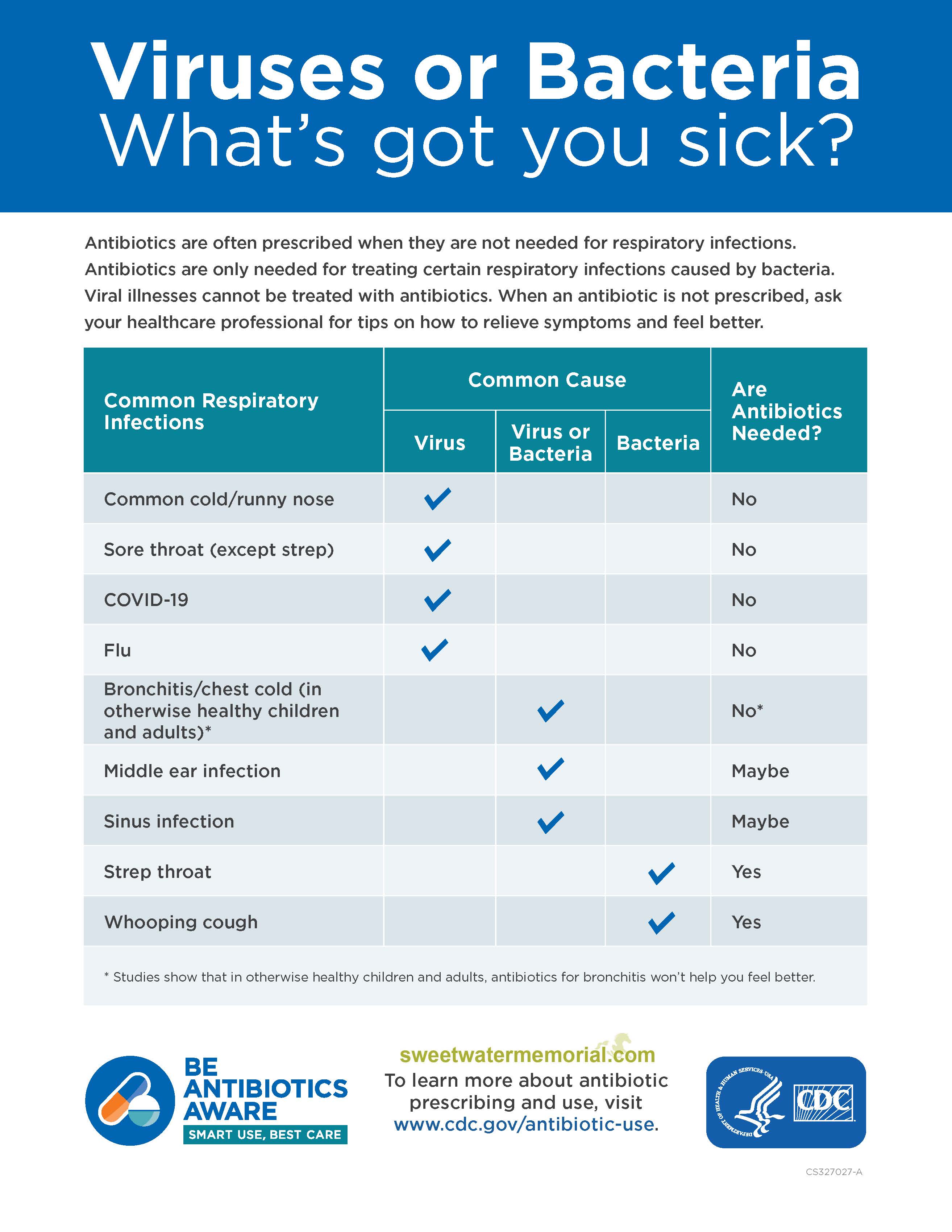Antibiotics aren't always the answer
- Category: Health & Wellness
- Posted On:
- Written By: Deb Sutton, Sweetwater Memorial Marketing Director

MHSC & CDC have 5 things you should know about antibiotics
Got a sneeze or a sniffle? Antibiotics aren’t always the answer.
If it’s the common cold, that’s a virus and doesn’t require antibiotics. The healthcare professionals at Memorial Hospital of Sweetwater County want patients to know harm can be done by prescribing antibiotics when they’re not needed.
“We often hear from patients who think antibiotics are automatically the answer,” said Kati Moczulski, a certified family nurse practitioner at Sweetwater Walk-In Clinic. “We carefully evaluate our patients. If they don’t need antibiotics for a viral respiratory infection, we explain what they can do to feel better and when to come in again for care if they don’t feel better.”
Too many antibiotics are being prescribed unnecessarily to people in the United States. The Centers for Disease Control and Prevention estimates about 47 million antibiotic courses are prescribed for infections that don’t need antibiotics, like for colds and the flu.
CDC advises: Those who are sick take antibiotics only when they are needed as an important way to protect yourself and your family from antibiotic resistance. Talk to your doctor about the best treatment if you are sick. Never pressure your doctor to prescribe an antibiotic.
Here are 5 things Sweetwater Memorial and the CDC want you to know about antibiotics:
Antibiotics do NOT treat viruses: Antibiotics do not treat viruses that cause colds, flu, or COVID-19. An antibiotic will not make you feel better if you have a virus. Respiratory viruses usually go away in a week or two without treatment. Ask your healthcare professional about the best way to feel better while your body fights off the virus.
Antibiotics for certain bacteria: If you need antibiotics, take them exactly as prescribed. Talk with your healthcare professional if you have any questions about your antibiotics. Antibiotics are needed only for treating certain infections caused by bacteria, but even some bacterial infections get better without antibiotics. Antibiotics aren’t needed for many sinus infections and some ear infections. Anti-fungal drugs treat fungal infections.
Antibiotic resistance: Taking antibiotics can contribute to the development of antibiotic resistance. Antibiotic resistance occurs when germs like bacteria and fungi develop the ability to defeat the drugs designed to kill them. If antibiotics lose their effectiveness, then we lose the ability to treat infections, like those that lead to sepsis. Antibiotics can save lives. When a patient needs antibiotics, the benefits outweigh the risks of antibiotic resistance and side effects.
Side effects: When antibiotics aren’t needed, they won’t help you, and the side effects could still cause harm. Side effects range from minor to very severe health problems. When you need antibiotics for a bacterial infection, the benefits usually outweigh the risk of side effects.
Talk with your healthcare professional if you develop any side effects, especially severe diarrhea, since that could be a Clostridioides difficile (C. difficile or C. diff) infection, which needs to be treated immediately.
Do your best to stay healthy and keep others healthy: Clean hands by washing with soap and water for at least 20 seconds or use a hand sanitizer that contains at least 60% alcohol; cover your mouth and nose with a tissue when you cough or sneeze; stay home when sick; and get recommended vaccines, such as the flu and COVID-19 vaccines.
For more on this and all Sweetwater Memorial has to offer, go to sweetwatermemorial.com.
For more information on antibiotics, speak to your physician or go to CDC.gov. Check out these links:
- https://www.cdc.gov/antibiotic-use/pdfs/Runny-Nose-H.pdf
- https://www.cdc.gov/antibiotic-use/pdfs/EAR-INFECTION-H.pdf
- https://www.cdc.gov/antibiotic-use/images/VirusOrBacteria-Original-1200by675.jpg




